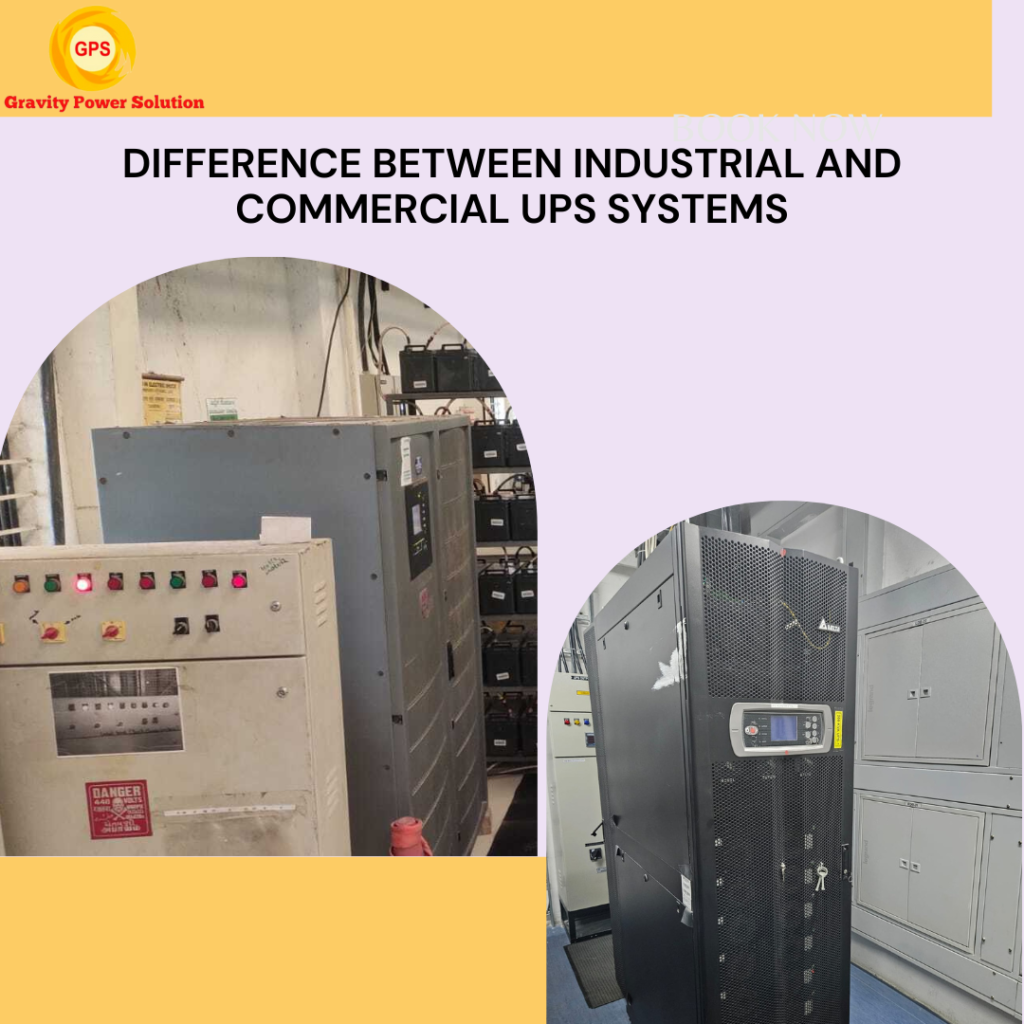Difference Between Industrial and Commercial UPS Systems
Uninterruptible Power Supply (UPS) systems play a crucial role in safeguarding equipment from power disturbances, ensuring continuity and protecting against potential losses. However, when choosing a UPS system, it’s essential to understand the differences between industrial and commercial UPS systems, as they are designed for distinct applications and environments. In this article, we’ll break down the key distinctions to help you make the right decision for your power protection needs.
Purpose and Application
The primary difference between industrial and commercial UPS systems lies in their intended use.
Industrial UPS systems are engineered to support critical processes in harsh and demanding environments, such as manufacturing plants, oil and gas refineries, and mining operations. These environments often experience extreme temperatures, dust, and humidity, which require robust, durable, and reliable UPS systems.
Commercial UPS systems, on the other hand, are designed for office settings, data centers, retail spaces, and other business environments. They provide power backup for more common applications like IT equipment, telecom systems, and point-of-sale devices. Commercial UPS systems are typically used in controlled indoor environments.

Power Capacity and Duration
The power capacity of industrial and commercial UPS systems also differs significantly.
Industrial UPS systems generally provide higher power capacity (often in megawatts) to support large-scale machinery and critical operations for extended periods. They are designed to maintain uptime for entire industrial plants or large sections of them during outages or fluctuations.
Commercial UPS systems usually have lower capacity (in kilowatts), sufficient to keep smaller, less energy-intensive equipment running for shorter durations. These systems are ideal for preventing data loss or business disruptions in the event of brief outages.
Durability and Design
Industrial environments demand rugged, highly durable UPS systems that can withstand physical challenges.
Industrial UPS systems are built with heavy-duty components that can operate efficiently under challenging conditions such as high temperatures, dust, and moisture. They also feature advanced cooling systems and enhanced protection against electrical interference.
Commercial UPS systems prioritize compact design and ease of installation. While durable, they are not intended for extreme environments, and their protection features are more suited for office-based electronics and computer systems.
Maintenance and Monitoring
Given their critical roles, industrial UPS systems typically require more rigorous maintenance schedules, with real-time monitoring systems to ensure continuous operation. Commercial UPS systems, while monitored, often have simpler maintenance requirements and are easier to manage.
Technical Points: Difference Between Industrial and Commercial UPS Systems
| Technical Aspect | Industrial UPS Systems | Commercial UPS Systems |
|---|---|---|
| Power Capacity | Designed to handle high power loads, often ranging from hundreds of kW to MW. Supports heavy-duty machinery in industries like oil, gas, and mining. | Provides lower capacities, typically ranging from a few kW to tens of kW. Suitable for office equipment, small data centers, and telecom systems. |
| Operating Environment | Built to operate in harsh conditions with extreme temperatures, dust, humidity, and chemicals. Equipped with rugged components and advanced cooling. | Designed for controlled indoor environments such as offices, retail spaces, and data centers. Requires less environmental protection. |
| UPS Topology | Uses double-conversion (online) topology, continuously converting AC to DC and back to AC for stable, clean power. Critical for sensitive industrial equipment. | May use line-interactive or standby topology, providing power during outages without continuous power conditioning. Suitable for brief interruptions. |
| Redundancy and Scalability | Often designed with high redundancy (N+1, 2N configurations) for continuous operation. Scalable to meet large power demands in industrial facilities. | Less scalable, with limited redundancy. Optimized for smaller, predictable loads in office environments. |
| Runtime and Battery Backup | Equipped with large battery banks or external battery packs, providing extended runtime (hours) during outages. Ensures critical operations continue until power is restored or generators activate. | Offers shorter runtimes, typically minutes to an hour, enough to keep IT equipment running briefly for safe shutdown or transition to backup power. |
| Regulatory Compliance | Complies with strict industry-specific regulations such as IEEE, IEC, and NEMA for safety and performance in hazardous environments. | Meets general electrical safety standards (ISO, CE, UL) used in less demanding environments. |
| Maintenance Requirements | Requires frequent, specialized maintenance. Real-time monitoring systems ensure continuous operation and prevent downtime in critical processes. | Easier to maintain with less frequent checks. Relies on basic periodic inspections rather than continuous monitoring systems. |
| Feature | Industrial UPS System | Commercial UPS System |
|---|---|---|
| Critical Load Handling | Will not drop a critical load; static switch fails to bypass source | May drop load if static switch fails |
| Performance Testing | Performance testing is often required | Performance testing is not usually required |
| Design Life | 20+ years | 5-7 years |
| Ambient Temperature Range | 59 – 131°F (15 – 55°C) | 73 – 95°F (23 – 35°C) |
| Air Humidity | 10 – 95% RH | 10 – 55% RH |
| Air Contaminants | Can handle very dusty and corrosive environments | Low levels of air contaminants |
| Manual Bypass Scheme | Drum switch – zero break, independent of static switch | Circuit breaker only, needs static switch for zero-break transfer |
| Battery Life | VRLA and flooded batteries with up to 20 years of life | VRLA batteries with 5-year life expectancy |
| Battery Support Time Range | 60 – 480 minutes | 15 – 30 minutes |
Conclusion
When comparing industrial and commercial UPS systems, it’s clear that the right choice depends on the specific environment and power needs. Industrial UPS systems are built for high-demand, extreme environments, while commercial UPS systems are ideal for business and office applications. Understanding these distinctions will help you choose the UPS system that best suits your operational needs.

